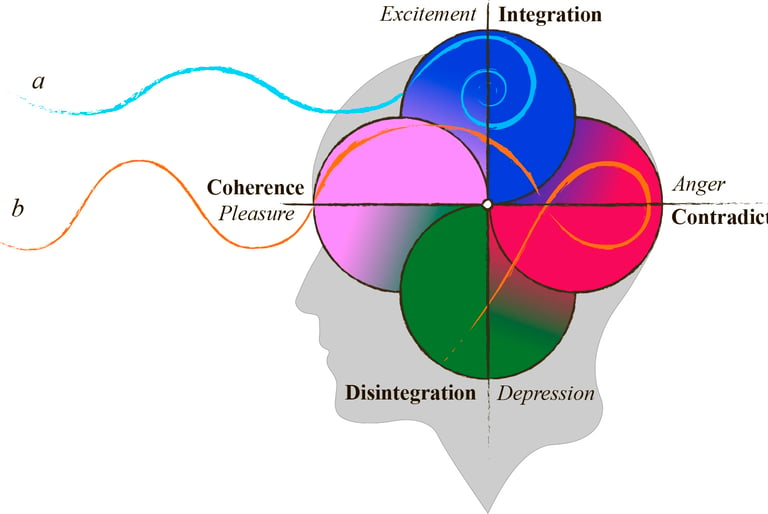Theory of Consciousness
Integrating the heritage of classical philosophy with contemporary science to uncover the principles of existence and how human consciousness functions
The nature and purpose of consciousness continue to be a topic of discussion. From an evolutionary standpoint, Ilya Kanaev presents an intriguing theoretical model known as the temporospatial theory of consciousness, which highlights the importance of aligning the world with the brain as a vital factor for behavioral regulation and adaptation. This model is evolutionarily successful only if it guarantees immediate integration among subsystems, which is achieved through intrinsic activity that is perpetually adjusted by incoming stimuli. In this context, human consciousness can be differentiated from other types of subjective reality, allowing for the tracing of the evolutionary reasoning behind subjective experiences. Additionally, this approach lays the groundwork for empirical research aimed at uncovering the most general states of subjective reality and their associated neural activities.
Kanaev Ilya A., Mei Han.
Reasoning involves individuality: An inquiry into divination practice and cognitive science.
Time and Mind. 2025, 3-4, 249–265.


In the common sense of the term, reasoning is defined as thinking in a logical and sensible manner that justifies one’s actions has long been central to philosophy. Within the Western tradition, it is generally associated with formal rules, where the structure of reasoning guarantees the validity of inference. This approach tends to treat human cognition as if it were the outcome of mere computation, such that any correct inference must hold true for anyone under the same circumstances. However, recent advances in cognitive science have shown that cognition is always embedded in contexts that shape and constrain one’s abilities. This study develops the authors’ interdisciplinary research in philosophy, anthropology, and cognitive science, aiming to provide a naturalistic account of the origin and development of human consciousness. In particular, it reviews anthropological data on divination practices in early China within the framework of modern scientific inquiry. A notable similarity emerges between these two conceptual systems, both of which imply a high degree of individuality in their modes of reasoning. The synthesis presented here reveals some fundamental modes of cognition shared by all humans and underlying every culture. In doing so, it contributes to cross-cultural studies and fosters deeper mutual understanding.
Kanaev Ilya A.
Entropy and Cross-Level Orderliness in Light of the Interconnection between the Neural System and Consciousness.
Entropy. 2023 (25), 418.


Despite recent advances, the origin and utility of consciousness remains under debate. Using an evolutionary perspective on the origin of consciousness, this review elaborates on the promising theoretical background suggested in the temporospatial theory of consciousness, which outlines world-brain alignment as a critical predisposition for controlling behavior and adaptation. Such a system can be evolutionarily effective only if it can provide instant cohesion between the subsystems, which is possible only if it performs an intrinsic activity modified in light of the incoming stimulation. One can assume that the world-brain interaction results in a particular interference pattern predetermined by connectome complexity. This is what organisms experience as their exclusive subjective state, allowing the anticipation of regularities in the environment. Thus, an anticipative system can emerge only in a regular environment, which guides natural selection by reinforcing corresponding reactions and decreasing the system entropy. Subsequent evolution requires complicated, layered structures and can be traced from simple organisms to human consciousness and society. This allows us to consider the mode of entropy as a subject of natural evolution rather than an individual entity.
Kanaev Ilya A.
Evolutionary origin and the development of consciousness.
Neuroscience & Biobehavioral Reviews. 2022 (133), 104511.


This review seeks to combine advances in anthropology and neuroscience to investigate the adaptive value of human consciousness. It uses an interdisciplinary perspective on the origin of consciousness to refute the most common fallacies in considering consciousness, particularly, disregarding the evolutionary origin of the subjective reality in looking for the neural correlates of consciousness and divorcing studies in neuroscience and behavioural sciences. Various explanations linked to consciousness in the field of neuroscience, supplemented with the theoretical explanation of an experience as an ongoing process of overlap between intrinsic neural dynamics and stimulation can be summarised as the stochastic dynamics of one’s control system experienced by the individual in the form of subjective reality. This framework elaborates on the world-brain research program and lays foundation for the quantitative description of one’s qualitative feelings and naturalistic science of consciousness. Furthermore, this study highlights the philosophical perspective of the inseparability between the physical correlates and the subjective reality contributing to the realistic ontology of conscious processes.
地址:
山东大学
儒学高等研究院
1801室
联系:
电话 | 微信:+86-13902409939
邮件:kanaev@qq.com
